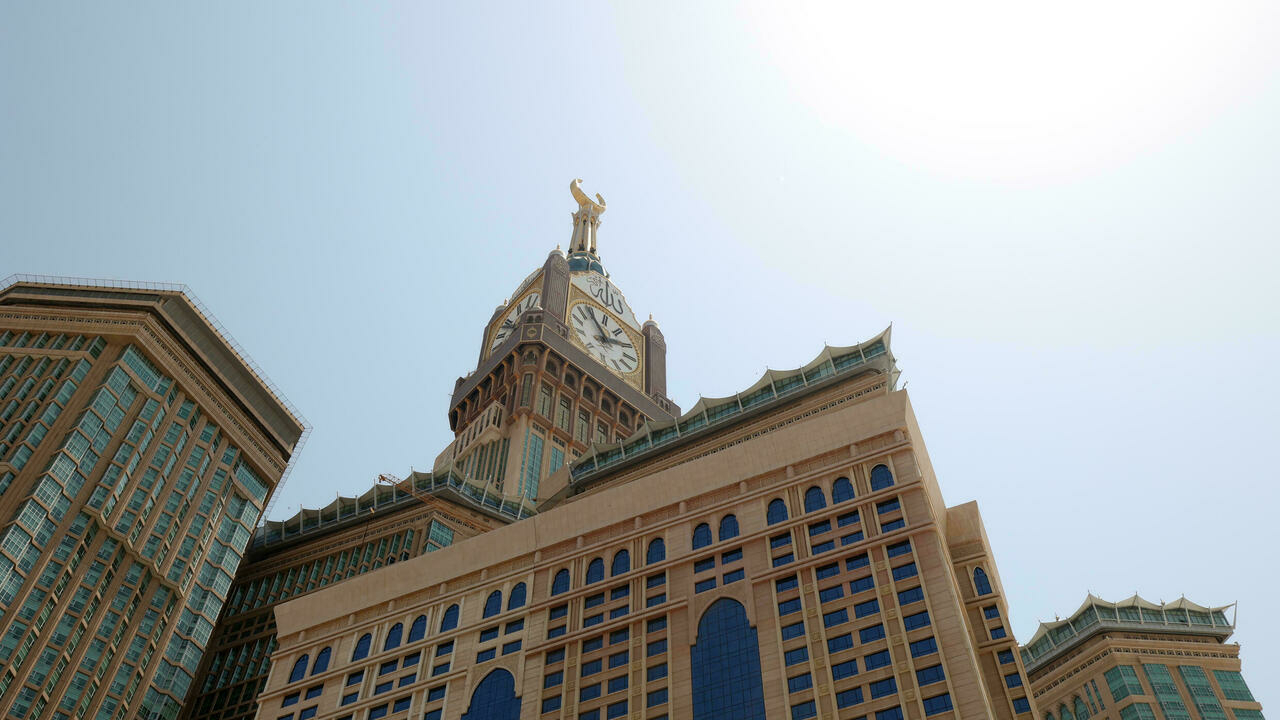
Countdown begins: the Mecca Royal Clock Tower, atop the Abraj al-Bait skyscraper complex in the Muslim holy city of Meccca, pictured on the eve of this year’s hajj
Advertising Read more
Mecca (Saudi Arabia) (AFP)
Pilgrims will begin to arrive in the Muslim holy city of Mecca on Saturday for the second downsized hajj staged during the coronavirus pandemic with only fully vaccinated residents permitted to participate.
The kingdom seeks to repeat last year’s success that saw no virus outbreak during the five-day ritual but nonetheless caused resentment among Muslims abroad.
It is allowing 60,000 residents of Saudi Arabia to participate through a lottery, higher than in 2020 but drastically lower than in normal times. Religious rites will begin on Sunday.
Among the chosen ones was Ameen, a 58-year-old Indian oil contractor based in the eastern city of Dammam, who was picked for the ritual along with his wife and three adult children.
“We are overjoyed,” said Ameen, who only gave his first name.
“So many of our friends and relatives were rejected,” he told AFP.
In 2019, some 2.5 million Muslims from around the world participated in the annual hajj — a key pillar of Islam that is a must for able-bodied Muslims at least once in their lifetime.
#photo1
Earlier this month, the hajj ministry said it was working on the “highest levels of health precautions” in light of the pandemic and the emergence of new variants.
Like the other countries of the Gulf, Saudi Arabia is home to significant expatriate populations from South Asia, the Far East, Africa as well as the Middle East.
“I feel like I won a lottery,” Egyptian pharmacist Mohammed El Eter said after being selected.
“This is a special, unforgettable moment in one’s life. I thank God for granting me this chance, to be accepted among a lot of people who applied,” the 31-year-old told AFP.
– ‘Restrict exposure’ –
Workers were shown on the Al-Ekhbariya news channel disinfecting the area in the Grand Mosque around the Kaaba — the focal point of Islam, towards which all Muslim pray — in anticipation of the start of rituals.
On Saturday the faithful will begin circling the Kaaba before officially starting the hajj on Sunday.
#photo2
Chosen from more than 558,000 applicants through an online vetting system, the event is confined to those who have been fully vaccinated and are aged 18-65 with no chronic illnesses, according to the hajj ministry.
Pilgrims will be divided into groups of just 20 “to restrict any exposure to only those 20, limiting the spread of infection”, ministry undersecretary Mohammad al-Bijawi told official media.
Saudi Arabia has so far recorded more than 507,000 coronavirus infections, including over 8,000 deaths.
More than 20 million vaccine doses against coronavirus have been administered in the country of over 34 million people.
#photo3
The hajj went ahead last year on the smallest scale in modern history, with authorities initially saying only 1,000 pilgrims would be allowed, before local media said up to 10,000 took part.
No infections were reported as authorities set up multiple health facilities, mobile clinics and ambulances to cater for the pilgrims, who were taken to the religious sites in small batches.
In normal years, the pilgrimage packs large crowds into congested religious sites, but even this year’s downscaled events are seen as a potential mechanism for contagion.
– ‘Biggest challenge’ –
“The biggest challenge of this hajj season will be for it to pass off without any Covid-19 infections,” a doctor working at a hospital in Mecca told AFP by phone.
Worshippers were last year given amenity kits including sterilised pebbles for the “stoning of Satan” ritual, disinfectants, masks, a prayer rug and the ihram, a traditional seamless white hajj garment, made from a bacteria-resistant material.
#photo4
Hosting the hajj is a matter of prestige for Saudi rulers, for whom the custodianship of Islam’s holiest sites is their most powerful source of political legitimacy.
But barring overseas pilgrims has caused resentment and deep disappointment among Muslims worldwide, who typically save for years to take part.
The hajj ministry received anguished queries on Twitter from rejected applicants about the tightly-controlled government lottery.
#photo5
“We are still anxiously waiting to be accepted, as though we’re facing an exam,” wrote one Twitter user.
And in addition to the many virus-related obstacles, the price of participating in this year’s hajj, including official taxes, is 12,000 riyals ($3,200).
burs-gw/dwo
© 2021 AFP






